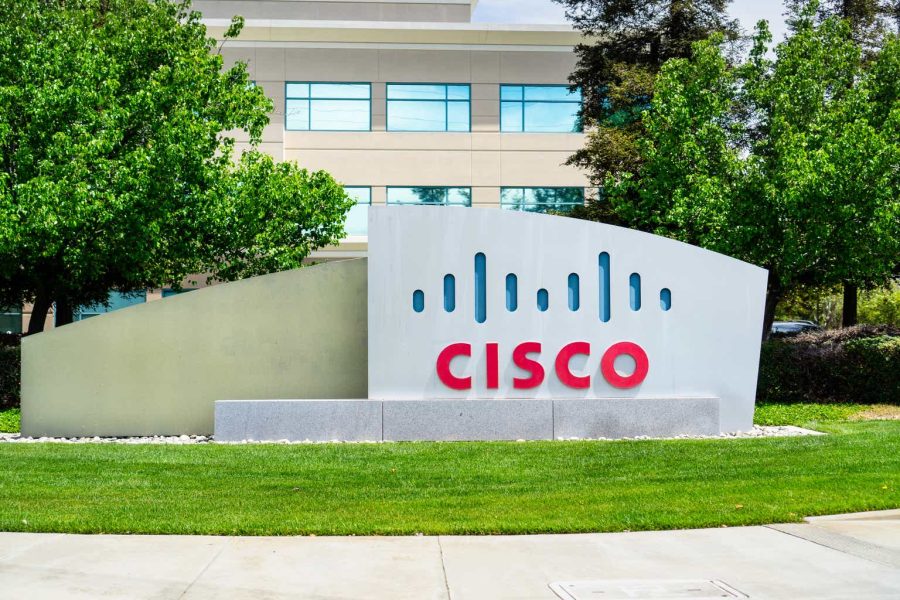Summary:
- While many tech stocks are selling at lofty valuations, others such as Cisco have fallen into value stock territory.
- Cisco shares today trade well below their 2000 peak, even as revenues and earnings per share are far higher today.
- I believe the company’s move into more recurring revenue businesses and adjacent fields such as cybersecurity will pay off over the longer term.
- Cisco is a relative bargain compared to its sector today and offers a respectable dividend yield as well.
Sundry Photography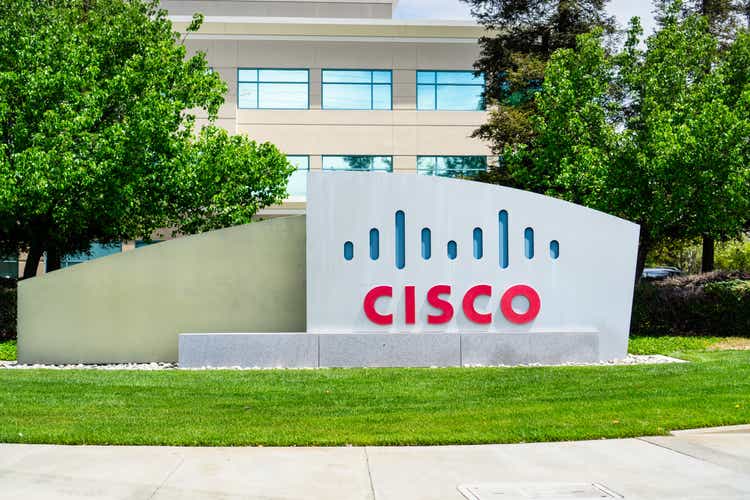
It’s interesting how market cycles play out. 25 years ago, Cisco Systems (NASDAQ:CSCO) was arguably the hottest stock in the world. At one point, it briefly obtained the title of being America’s largest market cap company with its valuation touching $500 billion at the peak.
At the time, investors were betting on a seemingly unending exponential growth curve in networking equipment. Telecom companies were greenlighting an unending array of fiber optic cables without a care in the world. That thesis did eventually play out. However, the dot-com investors got the timeframe dramatically wrong, leading to the subsequent 2000 dotcom bust. Cisco shares would lose the vast majority of their value, while many tech firms disappeared entirely.
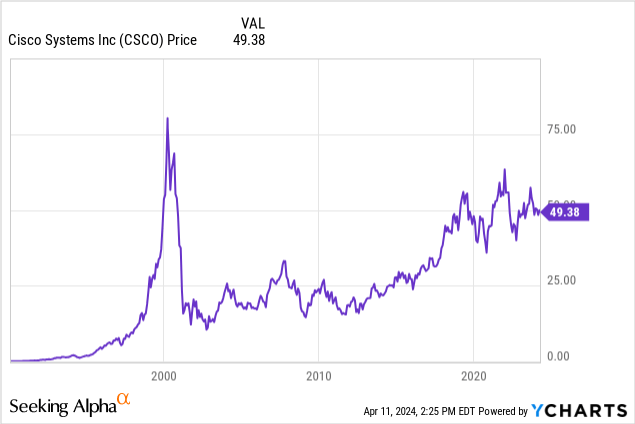
The fiber optic cables and Cisco networking gear eventually went into full usage as the internet really took off in the 2010s. Enterprises like Amazon (AMZN), Netflix (NFLX), and Spotify (SPOT) were able to build tremendous ecosystems around the ubiquity of cheap internet connectivity. That was cold comfort, however, for investors that had bought Cisco shares at the peak of the previous boom.
I mention this because times have changed. Now, investors are seemingly willing to pay almost any valuation for certain artificial intelligence and semiconductor companies.
Meanwhile, the picks and shovels purveyors of the prior booms are often trading at solid value prices. For example, Cisco, the leader of the networking boom, now finds itself trading at just 13 times forward earnings. Its market capitalization is around $200 billion today, far short of its prior peak. Yet, the underlying business has enjoyed stunning growth since 2000:
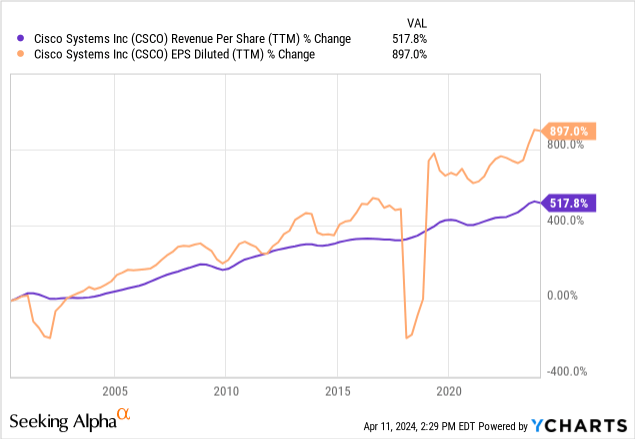
In fact, Cisco has grown revenues per share more than 500% since 2000, and EPS is up 897% over the same time frame. The stock price, however, remains considerably below its 2000 peak. Tech investors should never lose sight of the possibility of valuation compression, no matter how hot a business might seem to be at the moment. In fact, it makes you wonder if investors might be well served to rotate out of the highly valued momentum stocks of today and into companies like Cisco whose star has seemingly fallen even while the actual business is stronger and more profitable than ever.
It’s true that internet growth is no longer exponential in nature. However, total data and connectivity demand continues to rise with the occasional burst in activity such as the pandemic-driven work- and study-from-home trend. Even though the economy has reopened and there is a return to office movement in some circles, there appears to be considerable acceptance of remote work, video-conferencing, and other such data-intensive technologies which rely on core Cisco services.
In addition, Cisco has slowly updated its business model to become more attractive to investors. In the old days, Cisco primarily sold hardware. This was a lumpy business that was quite cyclical in nature. Nowadays, Cisco has converted much of its revenue base from one-time sales to a recurring subscription model, which leads to more predictability and helps shelter the company during industry downturns.
In addition, Cisco has smartly started offering key ancillary services such as cybersecurity which can naturally be upsold with its core networking gear.
Cisco is a cash cow and it is able to use that cash in large part to make more beneficial bolt-on acquisitions. See the company’s recent move to acquire Splunk, for example, which was a $28 billion cash deal. Cisco was able to fund that out of cash on hand, which means that it got to deploy cash that had been previously idle. The Splunk deal should be immediately accretive to earnings and greatly increases the stickiness of Cisco’s enterprise solutions. With Splunk’s ability to onboard, store, and search through massive amounts of machine-generated data and build functional apps and dashboards with that data, this expands the range of services Cisco can offer to IT departments. And Splunk’s data services appear to be a faster-growing vertical that can lift Cisco’s overall growth rate.
With Cisco generating in the neighborhood of $4 billion per quarter in free cash flow, it can pile up firepower for more such inorganic growth opportunities without straining the balance sheet.
This outsized cash flow has also allowed Cisco to be one of the more attractive dividend-paying firms within the tech space as well with shares currently yielding around 3%. That’s hardly extraordinary, but it’s a nice offering in a sector where most companies offer low payouts or no dividend whatsoever.
What could disrupt Cisco going forward? I believe the firm’s total addressable market will continue to grow. There was an argument that Cisco had reached full market saturation in the mid-2010s, but the firm has returned to growth thanks to its focus on recurring revenues along with M&A:
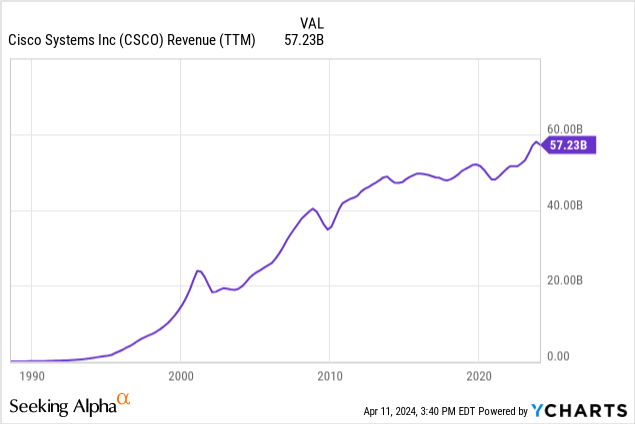
The core networking business is now a slow growth market, but there’s no indication that it will begin to shrink anytime in the near future. Often times, slow-growing markets can be the most profitable because they already highly consolidated and typically don’t have nearly as many new entrants as a faster-moving sector.
To be sure, Cisco faces serious competition from some firms like Arista Networks (ANET) that have invested heavily in certain segments of the market, and have better products than Cisco for some use cases. Cisco will need to keep investing in R&D and acquisitions to maintain a steady position in the long term.
For cybersecurity more specifically, Cisco faces a more sharply competitive landscape with firms like Palo Alto Networks (PANW) and Fortinet (FTNT), offering robust solutions in many categories when stacked up against Cisco. Cisco’s ability to compete in faster-growing adjacent markets will be crucial in determining just how much upside Cisco shares may have incoming years.
That said, I believe the core business is a robust one that will remain compelling for many years to come. And management is using its cash well. It returns the majority of cash flow to shareholders through the dividend and buyback program. The buyback program has real funding behind it, with the company retiring more than a billion shares of stock over the past decade:
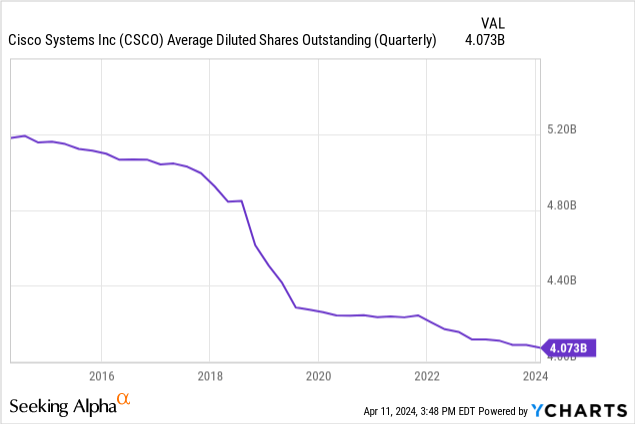
I’d also point out that Cisco has solid lock-in effects. Typically, enterprises that are happy with their networking solutions aren’t looking for a reason to switch providers. Also, Cisco has done a great job with training and certifications. Cisco has an extensive network of professional certifications and education for IT professionals. Networking experts can demonstrate their competence and skill with Cisco products as a resume feature, and because so many industry professionals are accustomed to using Cisco, they are unlikely to switch vendors. I believe this helps ensure that Cisco will maintain a strong competitive advantage for many years.
If Cisco is not able to grow the top line, such as what happened in the mid-2010s, total returns from here would likely be acceptable. With the stock offering a starting 6% earnings yield, even minimal EPS growth would lead to acceptable returns. And if Cisco can post 5%+ annualized EPS growth from today’s starting valuation, there’s a clear pathway to at least 10% annualized total returns if not a bit more even with the stock remaining at a low-to-mid teens P/E ratio.
Additionally, it’s quite possible that Cisco could obtain a higher valuation in the future if any of the newer fields that it’s working in such as cybersecurity really take off.
We’ve seen firms like Dell Technologies (DELL) and IBM (IBM) that had been left for dead soar recently thanks to excitement around their artificial intelligence units. These sorts of deep value tech stocks with tremendous underlying cash flow offer interesting optionality. The robust earnings and dividend tend to keep a solid floor underneath the stock price. And on the right tail, if something goes right and the business accelerates, you can get dramatic upside.
With all that in mind, Cisco seems like defensive way to play the technology sector. That’s particularly true in comparison to the seemingly bubbly valuations across many companies within the Nasdaq 100 Index today.
Analyst’s Disclosure: I/we have a beneficial long position in the shares of IBM either through stock ownership, options, or other derivatives. I wrote this article myself, and it expresses my own opinions. I am not receiving compensation for it (other than from Seeking Alpha). I have no business relationship with any company whose stock is mentioned in this article.
Seeking Alpha’s Disclosure: Past performance is no guarantee of future results. No recommendation or advice is being given as to whether any investment is suitable for a particular investor. Any views or opinions expressed above may not reflect those of Seeking Alpha as a whole. Seeking Alpha is not a licensed securities dealer, broker or US investment adviser or investment bank. Our analysts are third party authors that include both professional investors and individual investors who may not be licensed or certified by any institute or regulatory body.
If you enjoyed this, consider Ian’s Insider Corner to enjoy access to similar initiation reports for all the new stocks that we buy. Membership also includes an active chat room, weekly updates, and my responses to your questions.
